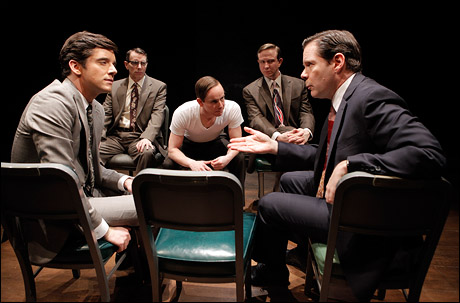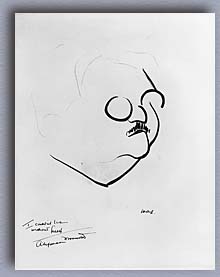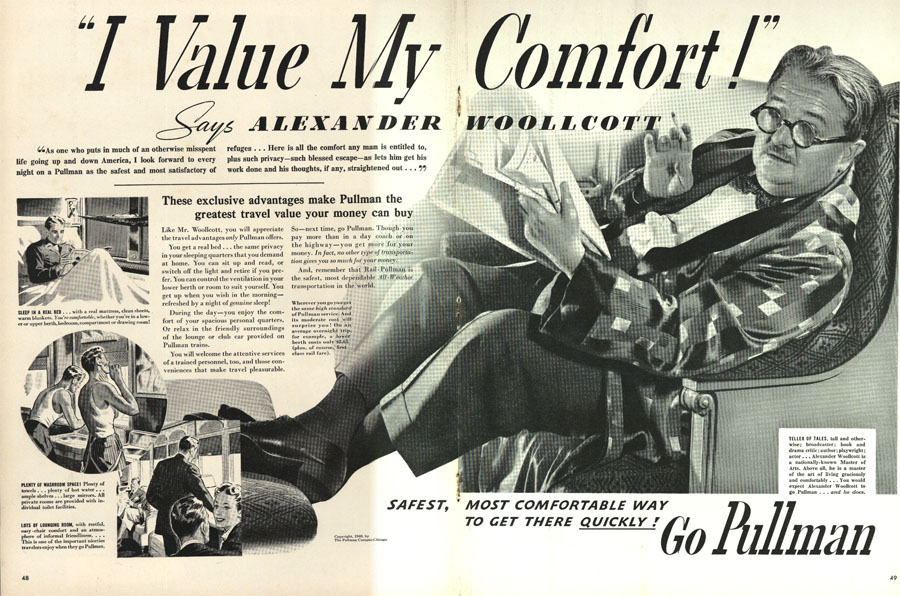My luck ran out. In today’s Wall Street Journal drama column I review three new plays, Next Fall, The Temperamentals, and Equivocation, only one of which I liked, and that one with reservations (though I do think it’s worth seeing). Here’s an excerpt.
* * *
In art, good intentions count for something–but not much. The intentions of Geoffrey Nauffts’ “Next Fall,” a new play about a man (Patrick Breen) whose much younger lover (Patrick Heusinger) is dying, are palpably high-minded, and I suspect that many playgoers will think that this makes it worth seeing. Alas, “Next Fall” is cliché-infested and cloyingly sentimental, and the fact that it has transferred to Broadway after a successful Off-Broadway run means only that you can fool some of the people most of the time.
To say what happens in “Next Fall” is to suggest its relentless predictability. Luke (Mr. Heusinger), a simple-minded but pretty young actor-waiter, falls for Adam (Mr. Breen), a bright but frustrated writer-candle salesman of a certain age. They move in together and would undoubtedly be destined for untroubled happiness were it not that Luke is a born-again Christian whose belief in God prevents him from coming to terms with his homosexuality and admitting it to Arlene (Connie Ray) and Butch (Cotter Smith), his extremely southern parents. Solution: He prays after having sex…
Don’t be fooled by the religious trappings of “Next Fall.” We’re in the world of movie-of-the-week dramaturgy, a never-never-land of tinsel epiphanies and black-and-white creatures like Butch, who is not a human being but a symbol of intolerance…
 If you want to see a worthwhile new gay play, I recommend Jon Marans’ “The Temperamentals,” which suffers from some of the same faults as “Next Fall” but has the distinct advantage of being intelligent and, up to a point, unpredictable. The good part is the first act, in which we meet a group of deeply closeted gay men living in Los Angeles in the ’50s, a time when homosexuals who dared to be themselves in public invited social ostracism–or worse. The five main characters of “The Temperamentals” are the founders of the Mattachine Society, one of America’s first pro-gay organizations, and in the first act Mr. Marans introduces us to these cautious, ever-watchful men, portraying them so shrewdly and sympathetically that you want to know much, much more about the way they lived then.
If you want to see a worthwhile new gay play, I recommend Jon Marans’ “The Temperamentals,” which suffers from some of the same faults as “Next Fall” but has the distinct advantage of being intelligent and, up to a point, unpredictable. The good part is the first act, in which we meet a group of deeply closeted gay men living in Los Angeles in the ’50s, a time when homosexuals who dared to be themselves in public invited social ostracism–or worse. The five main characters of “The Temperamentals” are the founders of the Mattachine Society, one of America’s first pro-gay organizations, and in the first act Mr. Marans introduces us to these cautious, ever-watchful men, portraying them so shrewdly and sympathetically that you want to know much, much more about the way they lived then.
I know that critics are supposed to review the show they saw, not the one they’d rather have seen, but I wish that Mr. Marans had dumped the second act of “The Temperamentals” and turned the first act into a full-length black comedy of manners about life in the Eisenhower-era closet. No sooner does “The Temperamentals” become an episode of “Great Gays in History” than it grows painfully preachy…
For sheer pretentiousness, it’d be hard to beat Bill Cain’s “Equivocation,” which has arrived in New York after making the regional rounds. This historical fantasia, in which we are invited to imagine what might have happened had King James I (David Furr) ordered William Shakespeare (John Pankow) to write a play about the Gunpowder Plot of 1605, is by turns self-consciously clever and elephantine in its contemporary political parallels…
* * *
Read the whole thing here.
Archives for March 2010
TT: Almanac
“It is occasionally indicated to us that we are apparently setting out to give the public what we think they need–and not what they want–but few know what they want and very few what they need. In any case it is better to overestimate the mentality of the public than to underestimate it. He who prides himself on giving what he thinks the public wants is often creating a fictitious demand for lower standards which he himself will then satisfy.”
Sir John Reith, BBC internal memorandum (November 1924)
TT: Curiosities (third in an occasional series)
 Alexander Woollcott, the critic-broadcaster-anthologist who figured in the first posting in this series, was on my mind this week. I’ve been rereading Cakes and Ale, Somerset Maugham’s best novel, in preparation for a review I’m writing of a new Maugham biography that will be published in May. It happens that my personal copy of Cakes and Ale is part of Woollcott’s Second Reader, an anthology that Woollcott edited in 1937. I tweeted about this fact the other day, and in the process of looking for an interesting image of Woollcott to run with the version of my tweet that I posted on Facebook, I ran across this wonderful advertisement:
Alexander Woollcott, the critic-broadcaster-anthologist who figured in the first posting in this series, was on my mind this week. I’ve been rereading Cakes and Ale, Somerset Maugham’s best novel, in preparation for a review I’m writing of a new Maugham biography that will be published in May. It happens that my personal copy of Cakes and Ale is part of Woollcott’s Second Reader, an anthology that Woollcott edited in 1937. I tweeted about this fact the other day, and in the process of looking for an interesting image of Woollcott to run with the version of my tweet that I posted on Facebook, I ran across this wonderful advertisement:

Being a critic and train buff, you can imagine how delighted I was by this ad. Imagine–if you can–a time when critics were solicited to provide paid endorsements for high-profile products!
TT: So you want to see a show?
Here’s my list of recommended Broadway, off-Broadway, and out-of-town shows, updated weekly. In all cases, I gave these shows favorable reviews (if sometimes qualifiedly so) in The Wall Street Journal when they opened. For more information, click on the title.
Warning: Broadway shows marked with an asterisk were sold out, or nearly so, last week.
BROADWAY:
• A Behanding in Spokane (black comedy, PG-13, violence and adult subject matter, closes June 6, reviewed here)
• Fela! * (musical, PG-13, adult subject matter, reviewed here)
• God of Carnage (serious comedy, PG-13, adult subject matter, reviewed here)
• The Miracle Worker (drama, G, too intense for small children, reviewed here)
• South Pacific (musical, G/PG-13, some sexual content, brilliantly staged but unsuitable for viewers acutely allergic to preachiness, reviewed here)
• A View from the Bridge * (drama, PG-13, violence and some sexual content, closes Apr. 4, reviewed here)
OFF BROADWAY:
• Avenue Q (musical, R, adult subject matter and one show-stopping scene of puppet-on-puppet sex, reviewed here)
• The Boys in the Band (drama, R, adult subject matter, closes Mar. 28, reviewed here)
• The Fantasticks (musical, G, suitable for children capable of enjoying a love story, reviewed here)
• The Orphans’ Home Cycle, Parts 1, 2, and 3 (drama, G/PG-13, too complicated for children, now being performed in rotating repertory, closes May 8, reviewed here, here, and here)
• Our Town (drama, G, suitable for mature children, reviewed here)
CLOSING SOON OFF BROADWAY:
• Venus in Fur (serious comedy, R, sexual content, closes Mar. 28, reviewed here)
CLOSING SOON IN PRINCETON, N.J.:
• American Buffalo (drama, PG-13/R, violence and very strong language, transferred from Chicago’s Steppenwolf Theatre Company, closes Mar. 28, reviewed here)
CLOSING NEXT WEEK IN LENOX, MASS.:
• Les Liaisons Dangereuses (drama, R, violence and sexual content, closes Mar. 21, reviewed here)
CLOSING SATURDAY IN ORLANDO, FLA.:
• Hamlet (Shakespeare, PG-13, reviewed here)
TT: Almanac
“The public does not like bad literature. The public likes a certain kind of literature and likes that kind of literature even when it is bad better than another kind of literature even when it is good. Nor is this unreasonable; for the line between different types of literature is as real as the line between tears and laughter; and to tell people who can only get bad comedy that you have some first-class tragedy is as irrational as to offer a man who is shivering over weak warm coffee a really superior sort of ice.”
G.K. Chesterton, Charles Dickens
OGIC: Lower
Last week I revisited Jacques Tourneur’s classic noir Out of the Past for the first time in 15 years, and I’ve had Mitchum on my mind ever since. I mean since 1995, of course. It’s an easy state to attain and a hard one to shake. (Just ask Mitchum’s first fan club: the Droolettes, dignity be damned.)
This time around, however, I found just as much of my attention fixed on Kirk Douglas’s nice turn as the elegant hood Whit Sterling. In his Mitchum biography Baby, I Don’t Care (yes, it is the best book title ever), Lee Server recounts a story from the set via Jane Greer. This, I find, accounts for quite a bit of the deliciousness of both performances.
The two got along well enough off the set, but the rivalry would flare as soon as the camera began to turn. Since Tourneur was not about to accept any obvious histrionics in his diminuendo world, Douglas was left to try and out-underact Mitchum, an exercise in futility, he discovered. He tried adding distracting bits of business during Mitchum’s lines and came up with a coin trick, running it quickly between the tops of his fingers. Bob started staring at the fingers until Kirk started staring at the fingers and dropped the coin on the rug. He put the coin away. In another scene, Douglas brought a gold watch fob out of his coat pocket and twirled it around like a propeller. This time everybody stared.
“It was a hoot to watch them going at it,” said Jane Greer. “They were two such different types. Kirk was something of a method actor. And Bob was Bob. You weren’t going to catch him acting. But they both tried to get the advantage. At one point they were actually trying to upstage each other by who could sit the lowest. The one sitting the lowest had the best camera angle, I guess–I don’t know what they were thinking. Bob sat on the couch, so Kirk sat on the table, then one sat on the footstool, and by the end I think they were both on the floor.”
Ebert’s review of the movie is well worth reading.
TT: Snapshot
Sid Caesar defines jazz:
(This is the latest in a weekly series of arts-related videos that appear in this space each Wednesday.)
TT: Almanac
“Insensibly he formed the most delightful habit in the world, the habit of reading: he did not know that thus he was providing himself with a refuge from all the distress of life; he did not know either that he was creating for himself an unreal world which would make the real world of every day a source of bitter disappointment.”
W. Somerset Maugham, Of Human Bondage
